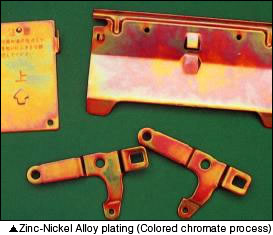HOME > Surface Finishing Tutorial > #149 Characteristics of Corrosion Resistant Plate Coatings
Surface Finishing Tutorial
#149 Characteristics of Corrosion Resistant Plate Coatings
Category : Electroplating
February 8, 2013
Corrosion resistant plate coatings have the following characteristics. Most corrosion resistant platings are of "Single layer".
|
※Secondary machinability: Ability to accept post-plating processes such as bending and deep drawing, etc.
| ※ | (Note 1) Principle of corrosion resistanceThe anti-corrosiveness of the corrosion resistant plating is brought by a plate coating that is more chemically active (Zinc) than the plated base metal (Steel). This is called Sacrificial Corrosion Prevention where the electro-chemically inferior plate coatings deposited on the metal surfaces will dissolve first before the base metals in corrosive environments. In other words, the plate coatings become the sacrifices to protect the base metals from corrosions. Traditionally, zinc has been used as the sacrificial metal for galvanized sheet steels, but lately zinc and nickel (5~10%) and steel (0.3~0.6%) alloy platings are used with 2~20 times of the corrosion resistance of the traditional means, and used as highly corrosion resistant yet thin and strong materials for automotive components. |
| ※ | (Note 2) Ionization tendencyThe [chemically active metals] mentioned in (Note 1) points to the metals with high ionization tendencies, generally. The following is the metals with high ionization tendencies in increasing order: K>Na>Mg>AL>Zn>Cr>Fe>Cd>Co>Ni>Sn>Pb>H>Cu>Hg>Ag>Pt>Au As shown, zinc is more tendency to ionize than steel. However, this order is not necessarily absolute. The order may change as the corrosive environment changes, such as metal ion concentration, etc. |

- Environmental conservation
- Hot Dipping
- Anodic Oxidation Process
- Anodic oxidation treatment
- Anodizing
- Corrosion - Corrosion Protection
- Electroless Plating
- Electroplating
- Heat treating
- Hydrogen embrittlement
- Metal cleaning
- Metal etching
- Painting
- Special paints
- Surface Treatment
- Surface-treated steel sheets
- Thermal Spraying



